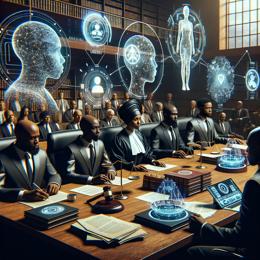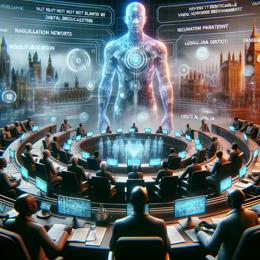Image created by AI
Alabama Supreme Court Declares Embryos as Children, Sparking Concern for IVF Accessibility
In a contentious decision that reverberates through the realms of law, ethics, and healthcare, the Alabama Supreme Court has recently ruled that frozen embryos can legally be regarded as children under state law. This landmark ruling clashes directly with White House perspectives and invokes concern from pivotal infertility associations nationwide.
Embarking from a lawsuit filed by three couples against a local fertility clinic due to the accidental destruction of their cryogenically stored embryos, the court's upheaval of a lower court's decision marks a seismic shift in legal precedent. The lower court had previously refuted the notion that embryos could be defined as people or children, leading to the dismissal of the wrongful death claim brought forward by the couples.
Yet the Alabama Supreme Court found grounds to diverge in a 7-2 verdict. Justice Jay Mitchell, leaning on an 1872 state law known as the Wrongful Death of a Minor Act and incorporating Biblical references, embraced a broad interpretation of the act to encompass children "born or unborn."
The implications for in vitro fertilisation (IVF) in Alabama are profound. IVF relies on the extraction and external fertilisation of eggs, with the subsequent potential for the embryos to be cryopreserved for future implantation. The ruling's hint at recognising embryonic personhood raises the spectre of daunting ethical and legal challenges, alongside the possibility of significantly increased cost burdens or the outright cessation of local fertility services as practitioners may wish to avoid legal entanglements.
The 14th Amendment, defining US citizenship post-birth, implicitly contrasts the Alabama court's determination. Despite the 1973 US Supreme Court case of Roe v Wade safeguarding abortion rights and clarifying that fetuses were not 'persons,' the 2022 overturning of this case resulted in aggressive legislative responses among several states, including controversial fetal personhood bills, albeit with varying definitions of when personhood begins.
The Alabama decision arguably represents a continuation of the broader push for fetal personhood. Dana Sussman of Pregnancy Justice remarked on the ruling's alignment with such an agenda and its potential dangers for reproductive freedoms. This threat is mirrored by concerns communicated by the Medical Association of the State of Alabama, which cautioned about the negative ramifications on IVF practices. A clinical chill spells trouble: Alabama could witness a mass exodus of fertility specialists, leaving would-be parents bereft of viable options within the state.
Reacting to the court's stance, Barbara Collura from Resolve: The National Infertility Association spoke to the AP, underscoring the philosophical and biological discrepancy in regarding an early-stage embryo as a person. Despite the fears of infertility advocates, the White House expressed its expectation of such legislative confusion in the wake of Roe v Wade's dismantlement, pointing to an ever-complex political intersection with individual family choices.
As discussions progress and anxiety mounts among those reliant on or considering IVF treatments, the future of reproductive technology in Alabama appears unsettlingly opaque. Ethical debates are not new, with figures like cognitive neuroscientist Michael S. Gazzaniga emphasizing our brains' role in defining humanity, thus questioning the assignment of personal rights to a neural system-lacking embryo.
Meanwhile, IVF, which remains legal across all states, including Alabama, steps into an uncertain landscape. Where constitutional rights, healthcare accessibility, and personal beliefs intersect, only time will tell the full story of the ripple effects instigated by a ruling intended to protect, yet potentially creating barriers.










